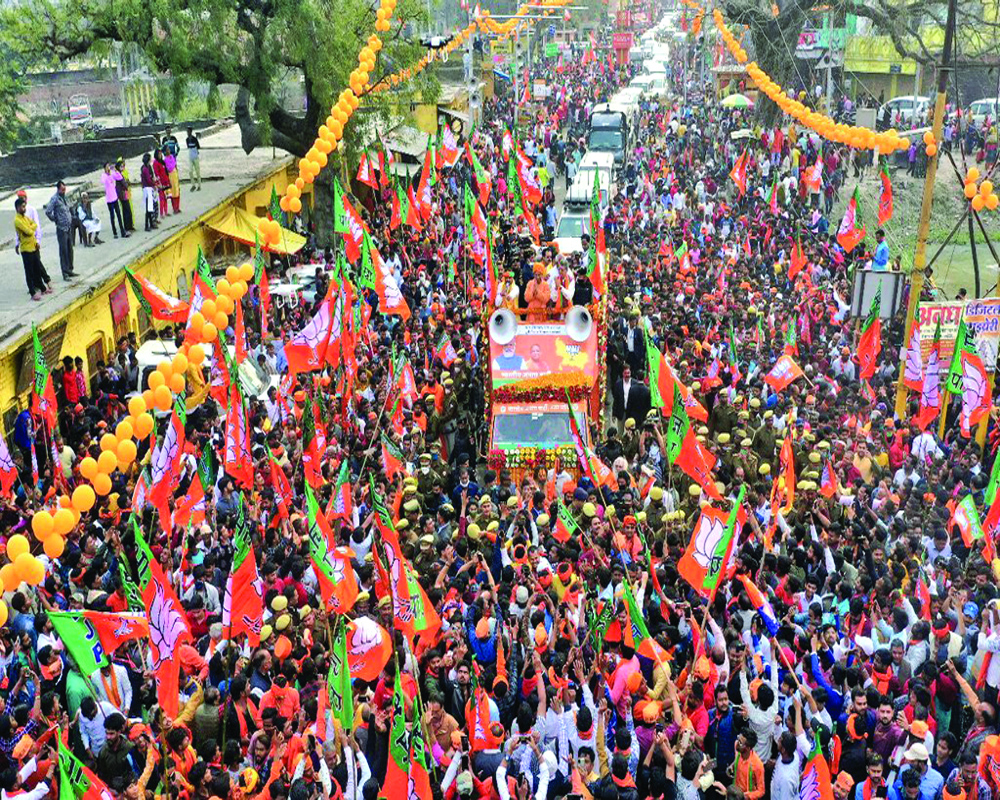The spirit of political party candidates seeking a place in the House has dwindled, and they make no effort to connect with volunteers or voters
The caller was repeatedly pressing the doorbell; sensing an emergency, one rushed out to open the gate. They were a couple of youngsters with pamphlets and badges of a political party prominently displayed on their person. They gave me a pamphlet, firmly instructing that I too must vote for their candidate, as all others in the constituency. Before I could open my mouth, they rushed towards their next target. Under some impulse, I asked them how and when I could see this illustrious person. Prompt came the reply: “Have you not seen him on TV? He is a busy person, cannot see or meet everybody!”
They had firmly put me in my place. I thanked them, and was left wondering whether this represents a transformation in the candidate-party-voter relationship. Obviously, they were no volunteers. They were least interested in the candidate, his victory or the party. I realised it is time for someone like me to erase the memories of candidates visiting voters, accompanied by volunteers, making courteous requests. As one speaks to people on elections on one-on-one basis, a painful reality comes to the fore: We don’t expect much change; in the past we have seen the winners devoting all of their time and energy to look after their family and cronies. Several political parties survive on considerations of caste, caste groupings, regionalism and religion. None of this harmonises with the spirit of the Constitution. The credibility of elected representatives has grossly declined; people don’t give them the respect that is the genuine due of every elected representative. One must hasten to add that the system functions because of exceptions; the representatives who understand the spirit of the Constitution, who are determined to serve their electors. It is no cliché that a considerable number of elected representatives rarely visit their constituencies.
Independent analysis of the contemporary electoral scenario clearly establishes a disturbing level of commitment to public good, declining sense of responsibility to transform the life of those standing last in the line and to help them lead a dignified life. One is convinced that wherever the elected representative has a clean image, corruption gets checked, which means considerable relief to the ‘last man in the line’. Sadly enough, such numbers are consistently on the decline.
Young persons in schools and colleges learn about the Constitution, and its emphasis on improving the lot everyone. Every child before he completes 10 years in school is expected to get familiar with the concepts and practices of democracy, the Republic and how these are woven into the Constitution. Eminent experts explain that in a Republic, people are supreme; elected Governments derive powers from people, though for a limited period. There is total emphasis on equality, irrespective of any and every diversity. Eminent constitutional expert Dr Subhash Kashyap indicates how Republics succeed, or fall: “Republics are created by the virtues, public spirit and intelligence of citizens. They fail when the wise are banished from public councils because they dare to be honest, and the profligate are rewarded because the flatter the people in order to betray them.”
Clearly, it is the cognitive capital of the nation, and emphasis on essential unity of all people that would decide the success or otherwise of the Republic in meeting the objectives enshrined in the Constitution. In a parliamentary democracy, the importance and significance of elections and the vote is expected to be well understood by voters. Towards this, people must be well aware of the extent to which the political parties respect the Constitution. Such deliberations must become an integral part of electioneering. Every political party vociferously declares total adherence to the values and vision of Dr BR Ambedkar. People have a right to analyse and identify those who are really serious about it. Ambedkar understood India, its people, its diversities and its inherent unity. He could envision rather precisely the hindrances and impediments to be faced at the implementation stage; and how these could really restrict the pace of socio-economic reforms. The Constituent Assembly had high aspirations of independent India regaining its rightful place in the comity of nations. Ambedkar expressed the sentiments of not only every member of the Constituent Assembly but also of every alert, active and responsible citizen of India: “I feel, however good a Constitution may be, it is sure to turn out bad because those who are called to work it happen to be a bad lot. However bad a Constitution may be, it may turn out to be good if those who are called to work it happen to be a good lot. The working of a Constitution does not depend wholly upon the nature of the Constitution. The factors on which the State’s organs depend are its people and the parties they set up as their instruments to carry out their wishes. Who can say how the people of India and their parties will behave?”
Indian democracy would flourish depending upon the numbers of elected representatives who comprehend these ideas, and have the courage and competence to put them into practice.
(The author works in education, social cohesion and religious amity. The views expressed are personal.)


























